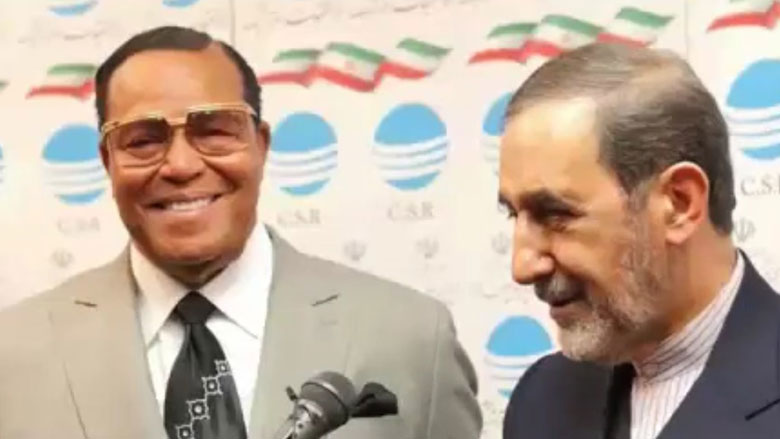February 19, 2016

Louis Farrakhan, the American black Muslim leader, addressed the grand celebrations of the Islamic Revolution in Tehran last Thursday, calling the revolution “wonderful” and Iran “stronger” since the end of sanctions and the United States a land of “tyranny” for African-Americans even today.
The regime used the celebrations to boost its hostility for the United States to a higher pitch. The parades in both Tehran and Qom included men acting like the 10 US sailors captured last month near Farsi Island (including one man in a wig and falsies portraying the female sailor taken captive).
The Islamic Republic also released more video taken of the sailors, including a snippet that showed a tear rolling down the cheek of one of the men. A US State Department spokesman said he viewed that with “disgust.”
There was also a poster showing the sailors in captivity on their knees labeled as “What rally happens” side-by-side with a picture of US armed troops coming out of a helicopter labeled “Hollywood.”
The gist of everything was that Americans were weaklings who posed no threat to Iranians.
Visiting for the celebrations marking the 37th anniversary of the revolution, Farrakhan, leader of the Nation of Islam in the United States, was given a featured role and prime speaking platform.
He both lauded the Islamic Republic and condemned the United States.
Before his formal speech, he met with Ali-Akbar Velayati, chief foreign affairs advisor to Supreme Leader Ali Khamenehi, and then spoke with a group of Iranian reporters.
“Since that revolution, Brother Velayati explained the stages that this great nation has undergone in establishing that wonderful revolution,” Farrakhan said.
“I would hope that at this later stage, where you are now coming out from under sanctions—sanctions that were designed by the West to destroy the revolutionary spirit of the Iranian people, and cause the Iranian people to rise up against their government,” he continued.
“But thanks to Allah, the people of Iran stood firmly with their leadership. And the sanctions only caused Iran to look deep within itself. And now those sanctions are being lifted. But Iran is stronger, Iran is wiser, Iran is more influential.”
An Iranian reporter asked Farrakhan through a translator why the US criticizes other nations for human rights abuses when human rights are “not well observed” at home.
“They hide behind noble words, but the human rights record in America is dismal,” Farrakhan replied.
“We have been in America for 460 years,” he said referring to when the Portuguese first brought African slaves to the Americas, long before there were any English-speaking colonies. “We did not come on the Mayflower, or the Nina, Pinta, or Santa MarÌa [the ships of Christopher Columbus]. We came in the holds of ships as slaves, and we have lived under tyranny from that day to this day,” Farrakhan said.
“The native people – the Indians – have lost 120 million people under human rights violations. So America needs to straighten up inside before she tells anyone outside about their violation of human rights.”
Despite the heavy speechifying from the rostrum in Azadi Square, the holiday this year, as every year, was a festive occasion with face-painted teens rollicking in the streets and vendors selling food and balloons.
Back in Washington, US Navy officials said they were still investigating how the two small Navy boats captured by Iran ended up many miles off their planned route and inside Iranian waters. One official told CNN the investigation is looking at three possible scenarios—that the sailors used their navigational equipment incorrectly; that the equipment malfunctioned and sent the sailors astray; or that Iran spoofed the GPS signals to mislead the sailors and draw them into Iranian waters. The investigators have reached no conclusion yet.